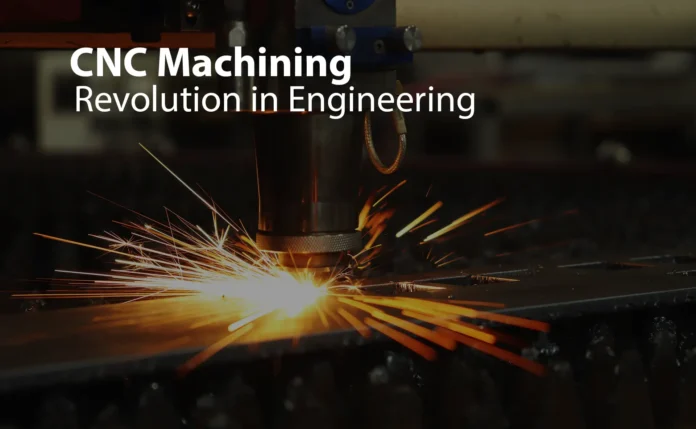The advent of the Fourth Industrial Revolution has heralded a new manufacturing age, marked by the seamless integration of advanced technologies to enhance productivity, precision, and sustainability.
At the heart of this transformation is CNC (Computer Numerical Control) machining, a technology that epitomizes the revolution’s ethos by marrying speed with accuracy and environmental consciousness.
This in-depth exploration delves into the multifaceted benefits of CNC machining, underscoring its pivotal role in elevating manufacturing to unprecedented heights.
Broadening Horizons with CNC Machining
CNC machining has emerged as a cornerstone of modern manufacturing, facilitating the production of intricate parts with unparalleled precision across diverse industries such as aerospace, automotive, medical, and more.
The transition from manual to digital manufacturing processes has accelerated production rates and ushered in an era of reduced waste, enhanced safety, and significant cost savings.
- Minimizing Waste and Championing Sustainability: One of the most compelling attributes of CNC machining is its ability to optimize material usage, drastically reducing waste. Through sophisticated software algorithms, CNC machines ensure that every millimeter of material is utilized efficiently, significantly lowering the environmental impact of manufacturing operations. This sustainable approach aligns with global efforts to conserve resources and mitigate industrial waste, marking a significant step towards eco-friendly manufacturing paradigms.
- Achieving Flawless Precision and Consistency: Automating CNC machines eliminates the risk of human error, ensuring that each component is crafted precisely. This consistency is vital in fields where the slightest discrepancy can lead to catastrophic failures. By maintaining strict adherence to design specifications, CNC machining guarantees the reliability and quality of every product, fostering trust and satisfaction among consumers.
- Elevating Production Efficiency: CNC machines’ capability to operate continuously, without fatigue or the need for breaks, dramatically enhances production efficiency. This relentless work ethic enables manufacturers to swiftly meet growing demands, ensuring supply chains remain robust and responsive. Furthermore, the agility of CNC machining facilitates rapid prototyping and customization, allowing manufacturers to adapt quickly to market trends and customer preferences.
- Prioritizing Worker Safety: The automation inherent in CNC machining significantly reduces the likelihood of workplace accidents, as direct human interaction with machinery is minimized. By confining operational tasks to software control, workers are shielded from potential hazards, fostering a safer work environment. This emphasis on safety protects employees and enhances operational continuity by reducing the incidence of work-related injuries.
- Maximizing Cost Efficiency: Despite the initial investment required for CNC machinery, the long-term economic benefits are substantial. Reducing material waste and decreasing energy consumption and labor costs result in considerable savings. Moreover, the high degree of precision and efficiency afforded by CNC machining minimizes the need for rework and scrap, further driving down production costs.
The Future of Manufacturing with CNC Machining
As industries continue to navigate the challenges of the Fourth Industrial Revolution, CNC machining stands as a beacon of innovation, offering solutions that transcend traditional manufacturing limitations. Its capacity for producing complex components with speed and precision paves the way for product design and functionality advancements, enabling manufacturers to explore new horizons of creativity and engineering.
Looking ahead, the integration of CNC machining with emerging technologies such as artificial intelligence (AI), the Internet of Things (IoT), and advanced materials science promises to unlock even greater efficiencies and capabilities. These synergies will enhance the performance and versatility of CNC machines and contribute to developing more innovative, more sustainable manufacturing ecosystems.
Conclusion
In an era of rapid technological advancement and an increasing emphasis on sustainability, CNC machining embodies the principles of the Fourth Industrial Revolution.
Its profound impact on manufacturing efficiency, product quality, and environmental stewardship heralds a new age of industrial innovation.
As we look to the future, the ongoing evolution of CNC technology will undoubtedly continue to shape the manufacturing landscape, driving progress towards a more efficient, sustainable, and innovative world.
Source Credit: https://amastone.com/


